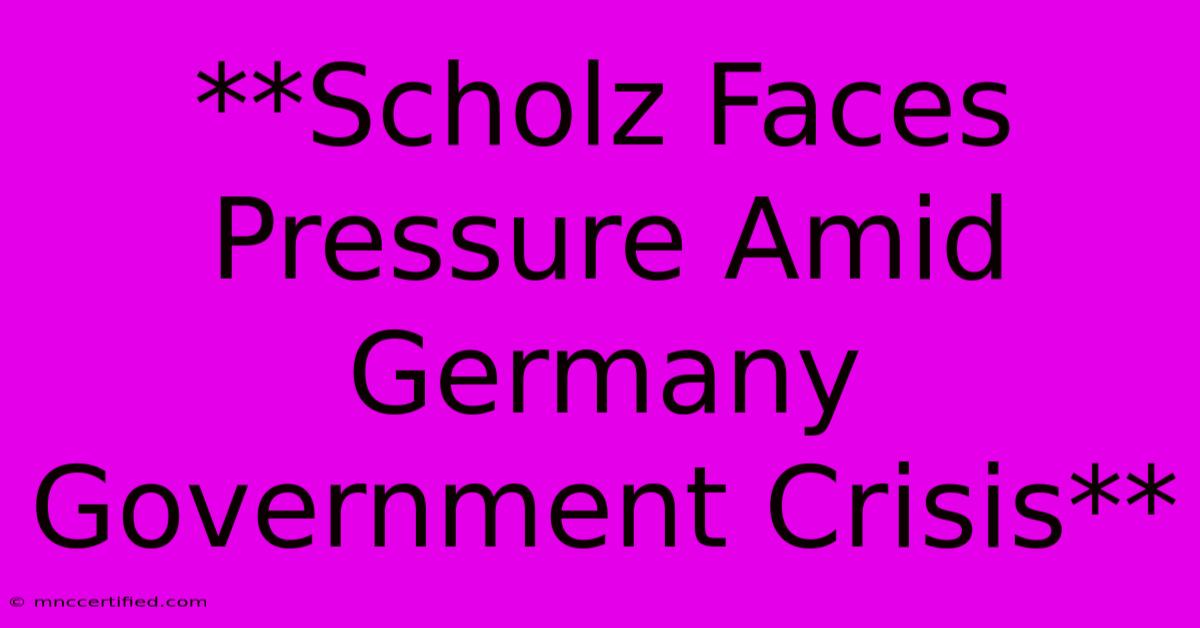**Scholz Faces Pressure Amid Germany Government Crisis**

Table of Contents
Scholz Faces Pressure Amid Germany Government Crisis
Germany's Chancellor Olaf Scholz is facing mounting pressure as the coalition government grapples with a series of crises, threatening its stability and potentially leading to early elections. The current turmoil stems from a confluence of factors, including the ongoing war in Ukraine, economic uncertainty, and internal disagreements within the governing coalition.
The War in Ukraine: A Catalyst for Discontent
The war in Ukraine has exacerbated existing tensions within the coalition, particularly between the Social Democratic Party (SPD), the Greens, and the Free Democratic Party (FDP). While the SPD and Greens have adopted a more hawkish stance on supporting Ukraine, the FDP has been more hesitant to provide military aid and has advocated for a more cautious approach. This divergence in foreign policy has fueled discord within the coalition, leading to public disagreements and undermining the government's unity.
Economic Woes Add to the Strain
Germany's economy is also facing significant headwinds, with rising inflation, energy shortages, and supply chain disruptions. The government's response to these challenges has been met with mixed reactions, with some criticizing its economic policies as insufficient and others questioning its ability to navigate the crisis.
Internal Conflicts Within the Coalition
Beyond the external pressures, the coalition is also grappling with internal conflicts. Disagreements over issues such as climate policy, migration, and taxation have repeatedly surfaced, leading to public bickering and undermining public confidence in the government. The FDP, in particular, has been accused of obstructing progress on key policy initiatives, further exacerbating tensions within the coalition.
Potential Consequences of the Crisis
The current government crisis has raised concerns about the stability of the coalition and the future of German politics. If the coalition collapses, it could lead to early elections, which would likely result in a period of political uncertainty and instability. The outcome of such elections remains uncertain, with no clear majority likely to emerge, potentially leading to a prolonged period of coalition negotiations.
Scholz Under Fire
Chancellor Scholz has been criticized for his handling of the crisis, with some accusing him of lacking leadership and failing to unite the coalition. Critics argue that his indecisive approach has further weakened the government and contributed to the growing sense of instability.
Outlook for the Future
The future of the coalition government remains uncertain. While some argue that the government will be able to weather the current storm, others believe that the crisis will ultimately lead to its collapse. The coming months will be crucial in determining the fate of the coalition and the direction of German politics.
Key takeaways:
- The war in Ukraine, economic challenges, and internal disagreements have put significant pressure on the German government.
- The coalition's stability is in question, with the possibility of early elections looming.
- Chancellor Scholz has been criticized for his handling of the crisis, with concerns over his leadership and ability to unite the coalition.
- The future of the government remains uncertain, with the coming months likely to be decisive in determining its fate.
This article has used the following SEO keywords:
- Germany
- Olaf Scholz
- Government Crisis
- Coalition
- Ukraine War
- Economic Woes
- Internal Conflicts
- Early Elections
- Political Stability
Off-page SEO strategies:
- Sharing the article on social media platforms
- Submitting the article to relevant online directories
- Engaging in relevant online forums and discussions
- Building backlinks from other high-quality websites
By following these SEO strategies, you can improve the visibility of your article and reach a wider audience.

Thank you for visiting our website wich cover about **Scholz Faces Pressure Amid Germany Government Crisis**. We hope the information provided has been useful to you. Feel free to contact us if you have any questions or need further assistance. See you next time and dont miss to bookmark.
Featured Posts
-
Man United 2 0 Paok Match Highlights And Analysis
Nov 08, 2024
-
Everlake Life Insurance Customer Service
Nov 08, 2024
-
Coventry City Sack Manager Mark Robins
Nov 08, 2024
-
Universal Insurance Company Charlotte Nc
Nov 08, 2024
-
Del Monte Healthy Snacks With Natural Ingredients
Nov 08, 2024